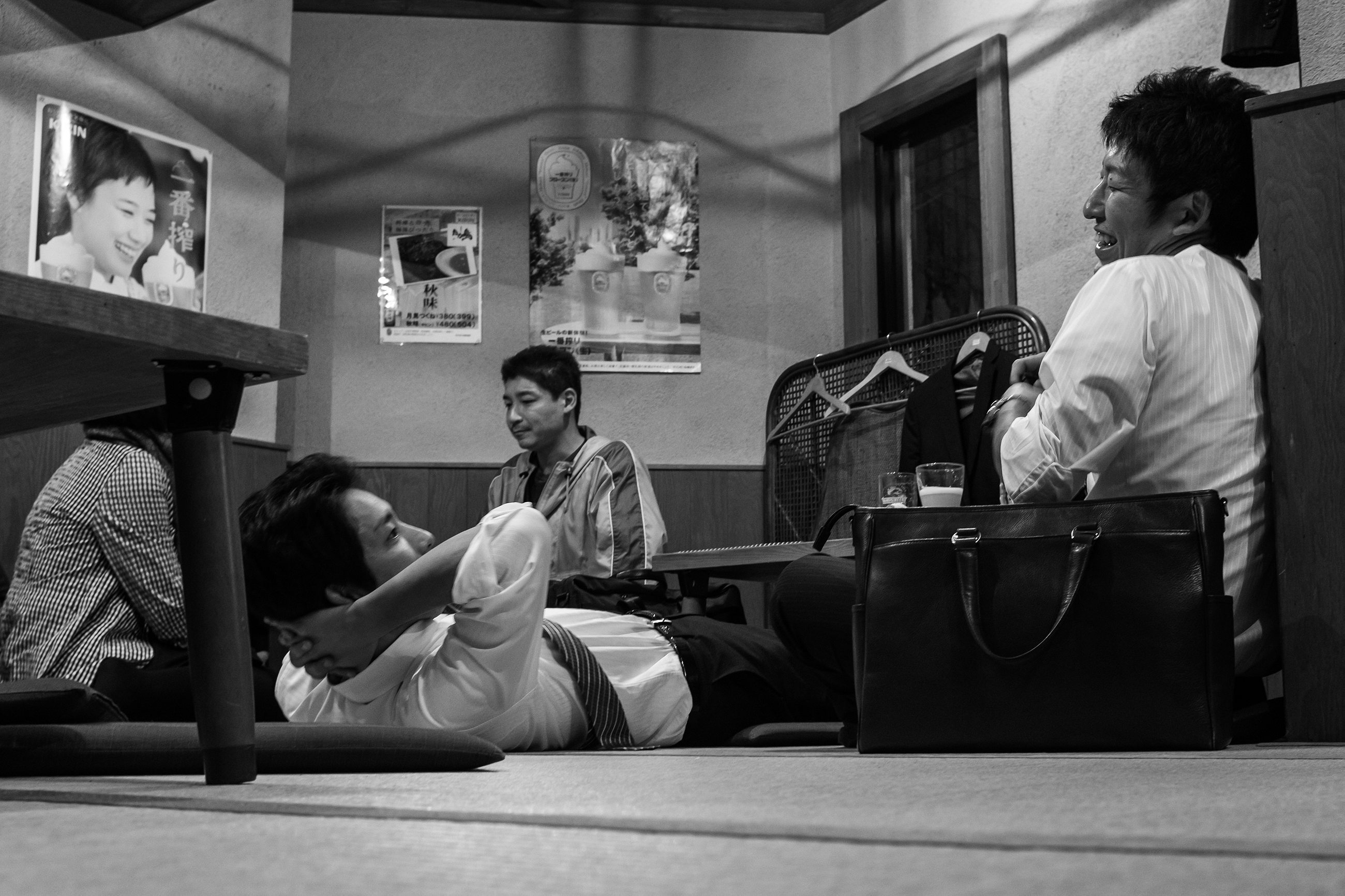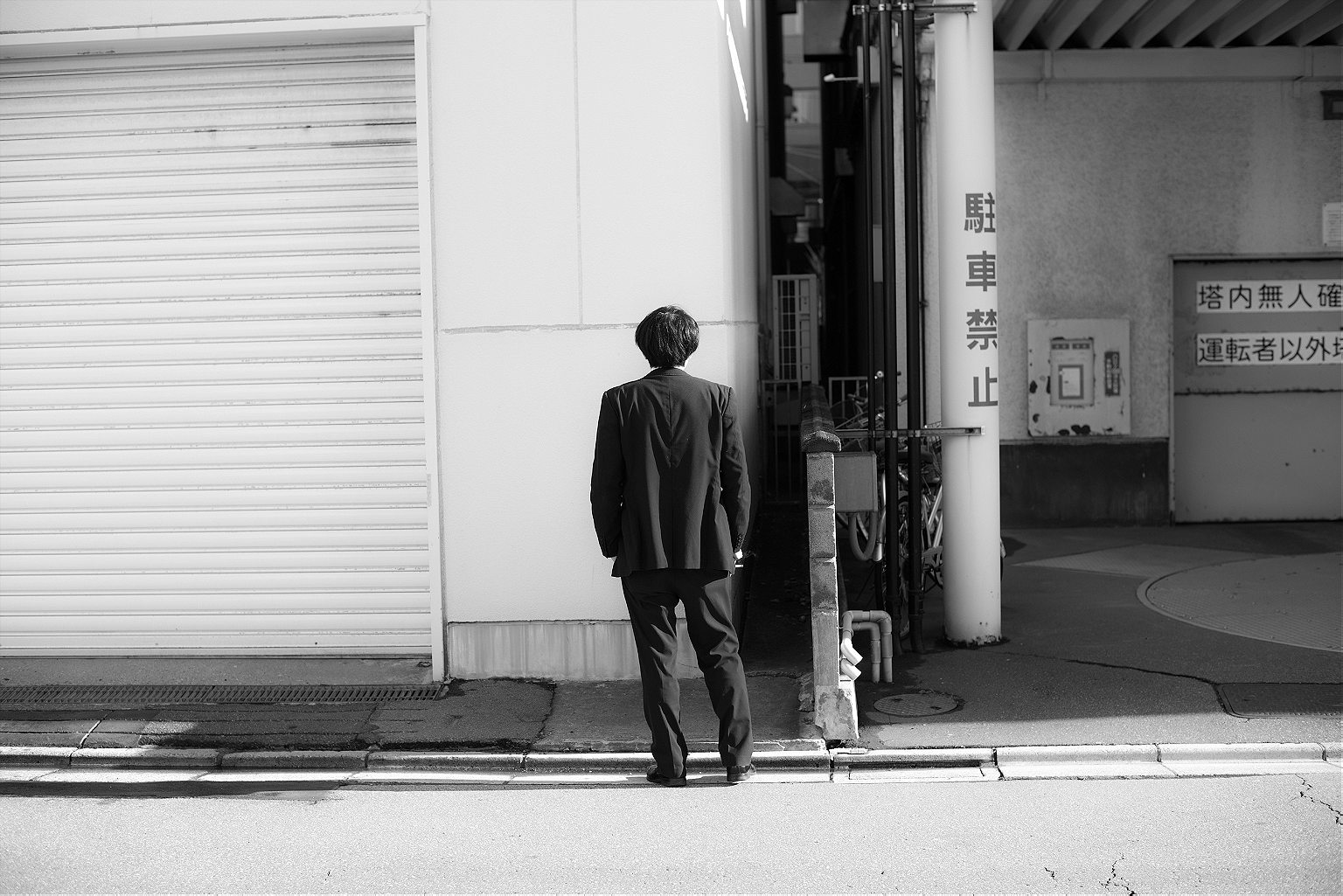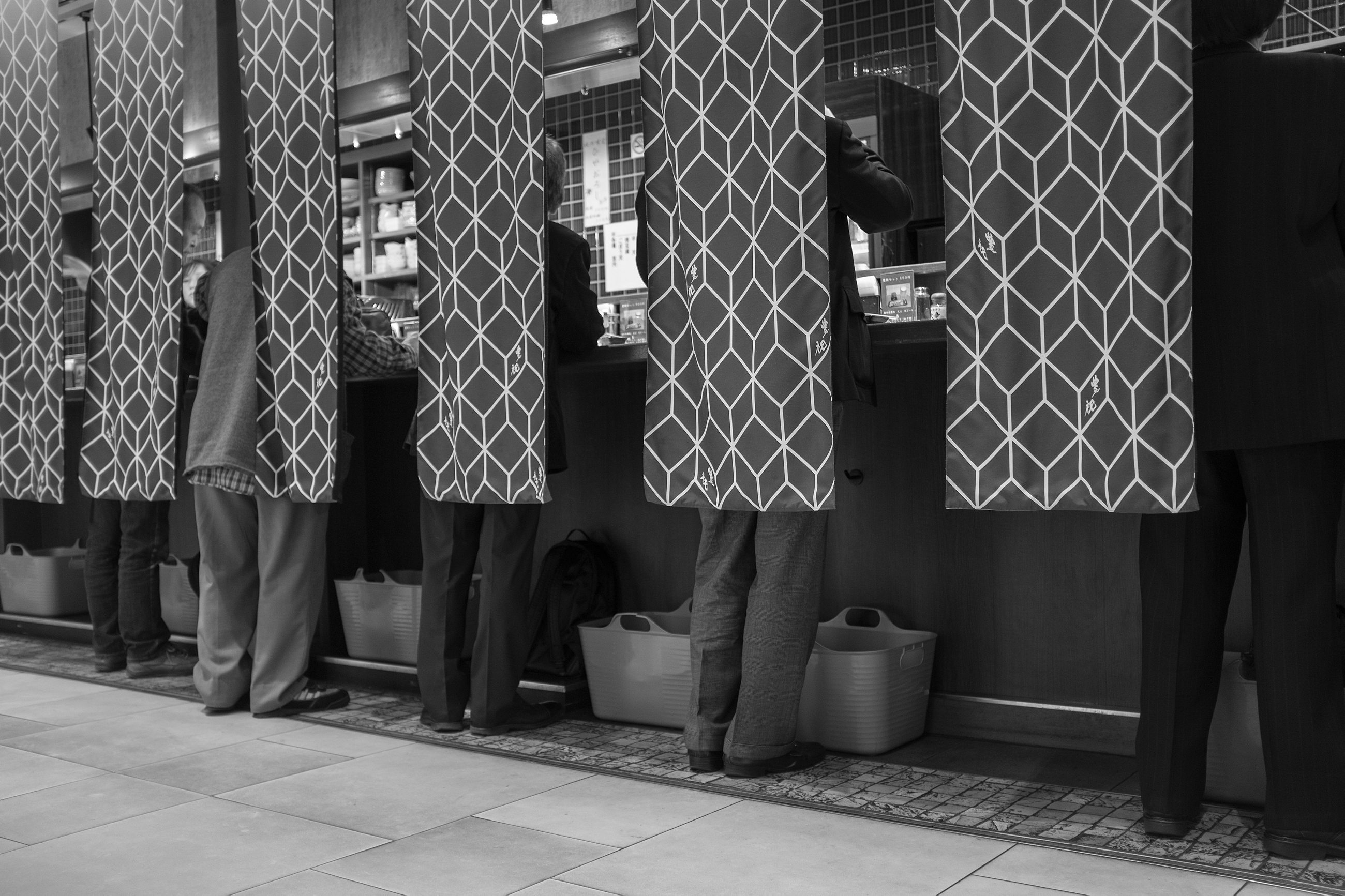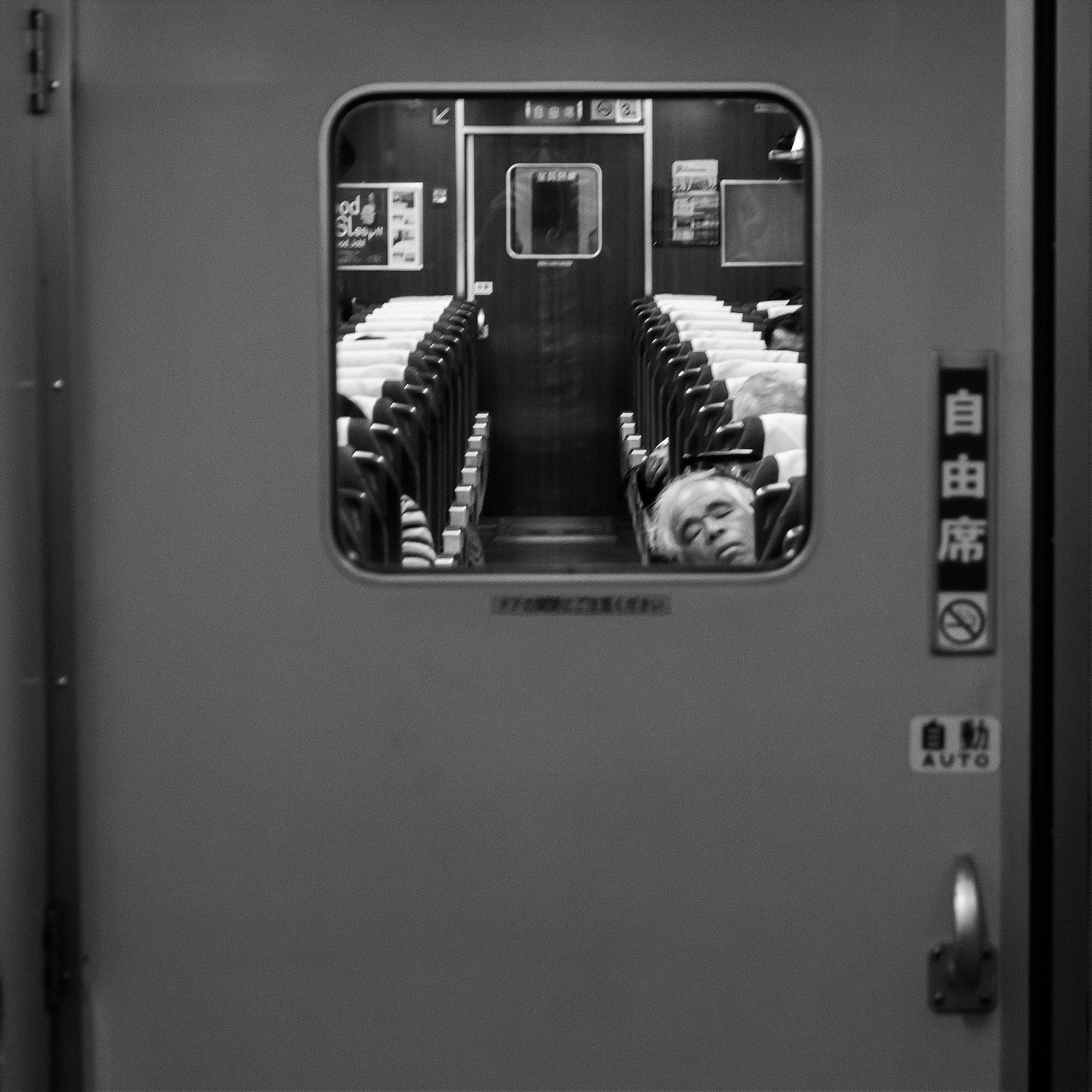Lawyers at Tokyo’s top firms are at the extreme end of a culture of torturous working hours
Scheduling after-work drinks was the hardest thing. When all your colleagues finish at 3:00 a.m. there isn’t much appetite to spend the few remaining hours before dawn drinking with the same people you’ve been with for the last 17 hours. Sleep is the only thing on your mind. On the odd occasion that I could get some tired souls to agree, mainly out of obligation than genuine desire, it was a brief affair because everyone was resigned to going back to the office afterward. Colleagues would greet one another with a polite grimace, a bow, and the phrase, “otsukare sama desu.”
Otsukare sama desu is not often taught in Japanese textbooks, but is ubiquitous in workplaces across the country. It literally translates into English as “you look tired”—the implication being that you must be working very hard. But it means much more. It’s a sympathetic phrase with a hint of hero worship that is indicative of the working culture in Japan.
Expectation, responsibility, and loyalty create a culture of overwork in Japan. White collar workers, known as salarymen, are recruited by large corporations directly out of university prior to graduation, and in some cases even out of high school. From that time on the bonds of loyalty and obligation are fastened with the promise of lifetime employment. Salarymen are expected to work excessive hours and are required to regularly put in unpaid overtime for the benefit of the corporation.
In extreme circumstances this kind of consistent overwork can be tragic. Karoshi—which directly translates into English as “death by overwork”—was first officially recognized in 1960 and is most often associated with sudden heart failure or heart attack due to immense work stress. In 2001, Hiroshi Kawahito, the Secretary General of the National Defense Counsel for Victims of Karoshi, estimated that there were 10,000 karoshi related deaths each year— more than the number of annual motor vehicle related deaths.
Lawyers and other specialists are not usually counted as salarymen but are still subject to the Japanese working culture, and in fact they exist on the extreme end of the spectrum in terms of number of hours worked.

In 2013, I worked as a foreign lawyer at one of Tokyo’s elite domestic law firms, one of eight gaijin at a firm of three hundred lawyers. For a year and a half I worked side by side, night after long night with my Japanese colleagues. During those late nights I came to understand the real meaning of otsukare sama desu.
The standard work day of a Japanese lawyer starts at around 10:00 a.m. and ends around 3:00 a.m. the next day, Monday to Friday. That’s already an 85-hour workweek, but it’s also usual for lawyers to work an additional ten hours on each Saturday and Sunday. The “weekend” as a period of rest and rejuvenation is more of an idea for these men—and they are almost exclusively men—than it is a reality. In practice it’s common for lawyers to block out a period of a few hours for some personal time and designate that as their weekend. Japanese lawyers work an average of 300-plus hours per month. Annually, they take less than ten days of leave.
Because of the long hours, most lawyers live within walking distance or a five-minute taxi ride from the office. Some days, breathless lawyers who’ve lost the gamble of attempting to snatch a few extra minutes of sleep and had to literally run to the office burst into morning briefings with halting bows and stuttered apologies.
Once at an 8:00 a.m. conference call I was joined by a colleague who rushed into the room, apologized for not arriving earlier, and promptly opened a large can of Red Bull, which he placed on the table next to his laptop. From his briefcase he procured yet another can of Red Bull and two cans of coffee. He was also a heavy smoker, and I half-jokingly told him that I was worried about his health. “Me too!” he said with a with a chuckle that poorly disguised his own concern.
When another colleague visited my apartment, fifteen minutes away from the office in a quieter, greener area of Tokyo, he wished that he could live in the same area too, but if the cost of getting four to four-and-a-half hours of sleep a night means living close to the office then he would rather make that sacrifice. “I’m hardly ever home anyway,” he reasoned with a shoulder shrug.
The most conspicuous thing about the Japanese workplace is the absence of complaint. Even in the early hours of the morning, at the end of a long week or in a private moment away from the office, I never heard a bad word about the firm or about what was being asked of its lawyers. Certainly everyone repeated that they were very, very tired, and there was the obligatory remark about the insurmountable workload, but no one ever expressed any regret about the pathway that they had chosen. Whenever they were asked about their workload and lifestyle, the lawyers would mumble “sho ga nai” (“it can’t be helped”), followed by a sigh and a knowing smile. Friends and colleagues would nod in understanding.

As a lawyer at a top tier firm in Australia, it was common to openly hear colleagues of all levels complain (rightly or wrongly) about having to work beyond the hours stipulated in their contracts, about having to work on a Friday evening or the weekend, about having to rearrange personal schedules to suit client needs. Some colleagues even complained about the frequency with which the stationery cupboard was refilled.
Non-Japanese lawyers who work in Japan often claim, with a hint of schadenfreude, that Japanese lawyers work such long hours because they are inefficient. But in my experience Japanese lawyers are just as efficient as non-Japanese lawyers; the difference is that Japanese lawyers have an unusual dedication to seeing a task through to its absolute completion.
There is simply no concept that near enough is good enough.
Japanese lawyers will agonize over the correct interpretation of a statute and seek multiple sources to confirm their position, chasing every rabbit down every rabbit hole, no matter how deep. A task that might reasonably be completed within three hours then takes five hours as every t and i is crossed and dotted three times.
The sheer willingness to hand over so much of a 24 hour day, almost all the waking hours of your life, to your profession, and to pour your existence down the compassionless siphon of professional development, is a remarkable thing. Japanese lawyers identify themselves almost wholly through their occupation; their professional and personal pride is the same.
Indeed, the torturous hours are part of the identity. One colleague told me that on his first day joining the firm a senior lawyer said to him, “Welcome to hell.” I thought he was joking, but then he added that now that he’s a senior lawyer, he says the same thing to new hires.

This culture of overwork is not new to Japan. During the Japanese economic miracle, in the span of four decades post-WWII Japan literally rose from the ashes to become the world’s second largest economy where Japan Inc. was the envy of the developed and developing world.
When Ezra Vogel published the seminal Japan as Number One: Lessons for America, in 1979, the Japanese resurrection was complete and the humiliation of the recent past had been overcome. Japanese corporations were purchasing prime real estate in the major centers of the world, including New York, Los Angeles, and London. Numerous management books on the culture of Japanese corporations were written and studied and Japanese CEO’s enjoyed top billing at speaking functions. Even Hollywood paid its respects: In the late-eighties blockbusters Die Hard and Back to the Future II, for example, the Nakatomi Corporation and Mr. Fujitsu represented Japan Inc.’s corporate supremacy.
Lifetime employment was, and to some extent still is, customary in Japan. The loyalty of Japanese workers became legendary. In those heady days the most important thing in your wallet was your business card—a card that money couldn’t buy that not only demonstrated your worth, but also communicated your identity, to which corporate family you belonged.
Corporate loyalty became less about professional pride after the bubble economy burst in 1990 and Japan slumped into the Lost Decade. Loyalty came to be more about job retention and solidarity. In 1994 it was estimated that eight to 10 million Japanese workers, or one fourth of the male workforce, worked over 3,000 hours annually. Average working hours have continued to rise, reaching levels today higher than the frothy 1980s.
A friend once told me that some salarymen will pack four pairs of underwear in their briefcases on Monday just in case they wouldn’t be able to return home during the week. Another story I heard was about one Japanese salaryman who had surgery for a stomach ulcer during his lunch break and then returned to the office in the afternoon. It is also not surprising for fathers to be in the office rather than the delivery room during the birth of their kids.
The consequences of overwork stretch into retirement. A well-known anecdote is called the “Narita Divorce,” named after Tokyo’s main international airport. Upon retirement the company will pay for a round-the-world airfare for the retiree and his wife in recognition of a lifetime of service. Being sometimes the only lengthy period spent together during the husband’s working career, the couple comes to the realization that they are incompatible and, immediately upon returning to Narita airport, decide to separate rather than spend their retirement years together.

Despite the bleak picture, all of the above needs to be caveatted by an understanding that the culture of overwork is not due to systemic malice or exploitation in Japanese corporate culture. In fact, Japanese corporations are generous to their employees, relatively speaking. Japanese corporations recognize that they have an indirect responsibility for the well-being of the entire family unit of their employees.
Many corporations and government entities take active steps to improve the work culture and change the emphasis from more-being to well-being. Corporations actively encourage employees to leave on time—one Japanese bank plays lullaby music over the PA system at 8:00 p.m.—designate ‘no overtime’ days, and cap monthly overtime levels. This year the Japanese government introduced a new flexible work hours policy that allows government employees to arrive early and leave early. Though these practices honored in the breach more than in their operation tend to have low uptake rates. A friend of mine who is a senior bureaucrat laughed at the new policy, saying that the old work culture is still strong and the pressure to remain in the office until the boss leaves prevents them from leaving early, and they actually end up working longer hours than before.
In 2007, Mitsubishi UFJ Trust & Banking initiated a program to allow employees to go home up to three hours early to care for children or elderly relatives. After two years, only 34 of the company’s 7,000 employees had signed up for the program.
During my time, the official stance from the management committee on work-life balance was encouraging, but I saw many partners rush into the office late at night and leave cursing because the lawyer they were looking for wasn’t there when they needed him. Work and life, balanced in that order.
Often when I would leave the office in the late evening the soft sounds of gentle snoring would waft over the partitions—my colleague Masa was making do with what little free time he had during his packed day and night, catching a few minutes of valuable shut-eye. I would bid good night to the other lawyers in my shared office and we would all chuckle and cast a glance at the relieved, almost peaceful, look on Masa’s face; he had finally managed to escape the mania and get some rest, if only temporarily and while still at his desk.
Then the phone would ring and the spell would be broken. The next meeting was about to begin. Sho ga nai.